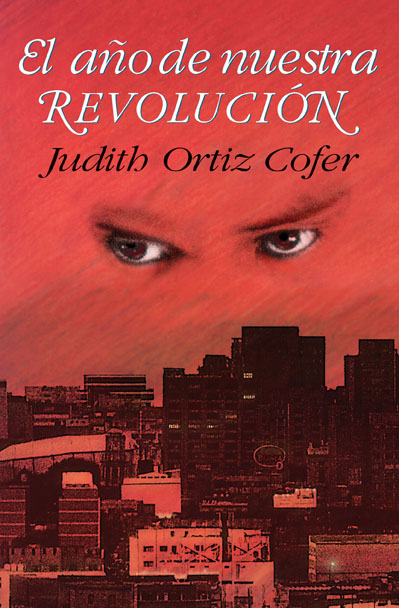Shimmering fragments of poetry, fiction, fable, and essay reflect a kaleidoscopic vision of burgeoning adulthood as seen through the eyes of the young protagonists in El año de nuestra revolución, the Spanish-language edition of Judith Ortiz Cofer’s award-winning collection, The Year of Our Revolution.
Among the memorable heroines to emerge from this landmark collection is María Elenita, aka Mary Ellen. As she embarks upon the journey from innocent adolescence to young womanhood, her imagination moves from thoughts of school and Supergirl to dreams of rock music, rebellion and first love. Donning the uniform of the opposition— tie-dyed T-shirts, Indian headbands and noisy jewelry with the aroma of patchouli incense wafting about her, Mary Ellen mounts her season of insurgency during which she awakens to sensuality with her “boy-poet” Gerald and the “soldier-boy” Pito. Ultimately she learns the high price to be paid for matters of the heart.
In a work suitable for mature older teens and young adults, Ortiz Cofer crystallizes what María Elenita’s saddened Mamá calls “the worst year in the history of parents and children… the year of our revolution.”
Won the 1999 Paterson Prize for Books for Young People
“Returning to the territory covered in An Island Like You and Silent Dancing, Cofer further heightens her descriptions of barrio life with a pervasive current of sensuality and rebellion in this volume of poems and stories about growing up during the turbulent 1960s. Most of the stories are described in hindsight by narrator Mary Ellen, who is also known as Maria Elenita (however, readers may have trouble keeping track of the various narrators in the early stories?which are all told through first-person narration but from differing ages and perspectives). Caught between Hispanic and American lifestyles, and eager to break free of traditional Hispanic values, Mary Ellen is strongly attracted to things that are alien to her parents. Readers will likely relate to Mary Ellen’s struggle for independence, her idealism and her need for answers, themes that Cofer carries through the entire collection. In “The Meaning of El Amor,” for example, the narrator sneaks into a nightclub where her recently deceased father, “the Puerto Rican Romeo,” moonlighted to find out why love causes so much suffering. Cofer’s lyrical descriptions of how music and the Vietnam War fired Mary Ellen’s youthful passions are affecting: “When she was deep into a song, Janis [Joplin] became beautiful. Her voice, hoarse and choked with pain, went right through my skin, and I began to understand the meaning of soul, el duende, in American music.” Readers in the suggested age range may miss the most rewarding aspects of Cofer’s work, but for mature teenagers, there is wisdom aplenty in this radiant collection.”—Publishers Weekly
“Judith Ortiz Cofer’s spirited multigenre collection includes poetry, myth, fiction, and essays from the viewpoint of young people coming of age in a troubling world. One of the major characters, Maria Elenita, follows her own curiosity and sense of adventure through awakening womanhood and the discovery of her sexual self. Her mother, according to Maria Elenita, decorated their home in “early Puerto Rican: a religious print in every room…. It came to be a symbol for me of our relationship in those days.” The matrilineal connection is revealed as both homeplace and battleground. The poem “Mamacita” describes mother as a prevailing presence who “hummed all day long / over the caboose kitchen” and “dragged her broom / across a lifetime of linoleum floors.” On the other hand, in the essay “Vida,” mother becomes controversy: “My mother started to complain about the little things Vida did, or did not do…. Mother was spreading her wings and getting ready to fight for exclusivity over her nest.” The revolution depicted is part of the human condition, the rough change from child to adult, couched in the bright colors of the barrio.”—Amazon.com
JUDITH ORTIZ COFER, a poet, novelist, and essayist, is the author of numerous award winning books, including An Island Like You: Stories of the Barrio (Orchid Books 1995, Penguin, 1997), recipient of the 1995 Pura Belpré Award, the ALA Best Books for Young Adults and the Horn Book/Fanfare Best Book of the Year List. Silent Dancing: A Partial Remembrance of a Puerto Rican Childhood (Arte Público Press 1991) received a PEN citation, the Martha Albrand Award for non-fiction, and a Pushcart Prize for the essay “More Room.” She is the recipient of the 1999 Paterson Prize for Books for Young People for The Year of Our Revolution. Most recently, she has published a bilingual book for children, ¡A bailar! / Let’s Dance! (Piñata Books, 2011); Animal Jamboree: Latino Folktales /La fiesta de los animals: leyendas latinas (Piñata Books, 2012), a bilingual collection of Puerto Rican folktales for middle readers, and The Poet Upstairs (Piñata Books, 2012), an inspiring picture book that demonstrates how poetry can change the world. She was a long-time professor of English and Creative Writing at the University of Georgia before her death in 2016.
ELENA OLAZAGASTI-SEGOVIA has translated several literary works, including Judith Ortiz Cofer’s The Line of the Sun (University of Georgia Press) and Silent Dancing: A Partial Remembrance of a Puerto Rican Childhood. She is a professor of Spanish at Vanderbilt University in Nashville, Tennessee.
ATOS Interest Level: Upper Grades
Category: Young Adult









